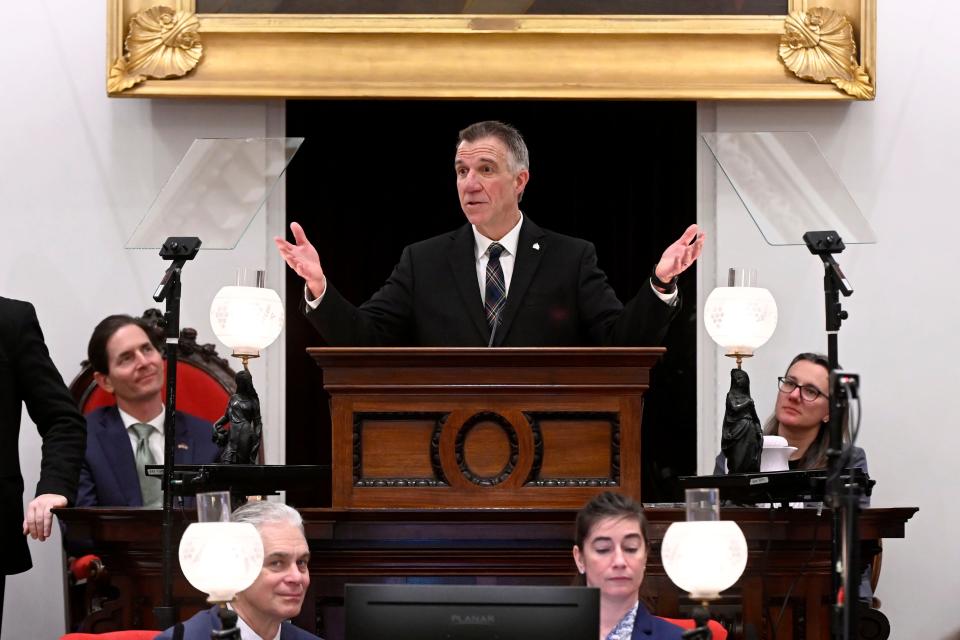What to know about phase two of Governor Scott's paid leave program for Vermont
- Oops!Something went wrong.Please try again later.
Paid family and medical leave is almost here for thousands more Vermonters.
On Feb. 15, Gov. Phil Scott and insurance giant The Hartford will launch part two of the voluntary Vermont Family and Medical Leave Insurance (VT-FMLI) program, which will allow Vermont employers with two employees or more to create customized paid leave plans for their companies.
Vermonters whose employers opt-in to the program will receive partial income replacement for leaves of absence, such as caring for a sick relative, meeting the needs of a family member in the military, bonding with a newborn baby and recovering from a personal serious health condition. Benefits start this July.

The program's first phase, which took effect last July, targeted solely Vermont state workers. By 2025, all remaining Vermont workers − people whose employers opted out of the program, businesses with less than two employees and individuals who are self-employed − will be able to purchase paid family and medical leave.
What will family and medical leave look like?
According to the Governor's Office, employers who opt-in to the program have some flexibility. Businesses can combine family and medical leave or provide family leave insurance on its own. Employers can also choose to cover all program contributions, divide the cost between themselves and their employees or make the benefits voluntary and require employees to pay in full. Additionally, companies can select how long family and medical leave will last − between six to 26 weeks within a 12-month period − and how much employees will receive in wage replacement − 60% to 70%, "with additional options available with underwriting review."
Why is paid family and medical leave a big deal?
Paid leave has been a priority in Vermont for years, with the first bill introduced in the Legislature over a decade ago, according to Vermont state Sen. Kesha Ram during an AARP meeting last November. Vermonters almost secured paid leave in 2019, but the bill was vetoed by Scott the following January.
"Everyone needs time off," said Ram, who took a leave of absence after the birth of her first child.
"It shouldn't be a privilege to do that," she said. "It means a lot to babies to get to know and bond with their parents."
New parents wouldn't be the only workers to benefit from paid family and medical leave, however.
The program will provide a "peace of mind for employees who need to take time away from work to care for themselves or their loved ones," said Megan Holstein, The Hartford's head of absence management for group benefits, in a Jan. 18 press release.
Additionally, Holstein said that family and medical leave helps businesses recruit and retain quality workers. Vermont, in particular, has struggled for years with "brain drain" and population decline.
How is Scott's plan different from the Senate bill?
As Scott and The Hartford prepare to roll out stage two of the Paid Family and Medical Leave Insurance program, a similar bill awaits approval in the Senate.
Passed in the House last March, H.66 would provide all workers up to 12 weeks of paid leave and up to 90% of Vermont's average weekly earnings. The program would be funded through a wage payroll tax, with benefits available by July 1, 2026.
Just like in 2019, Scott may veto the bill due to its "mandatory tax" on wages, calling his own collaborative paid leave program with The Hartford "a win-win."
"I believe we can accomplish our shared goal of providing the peace of mind of paid family and medical leave more efficiently, affordably and quickly than imposing another mandatory broad-based tax on already overburdened workers," Scott said in a December 2022 press release about his paid leave program.
Megan Stewart is a government accountability reporter for the Burlington Free Press. Contact her at mstewartyounger@gannett.com.
This article originally appeared on Burlington Free Press: Paid leave for Vermonters on target for July, says Phil Scott

